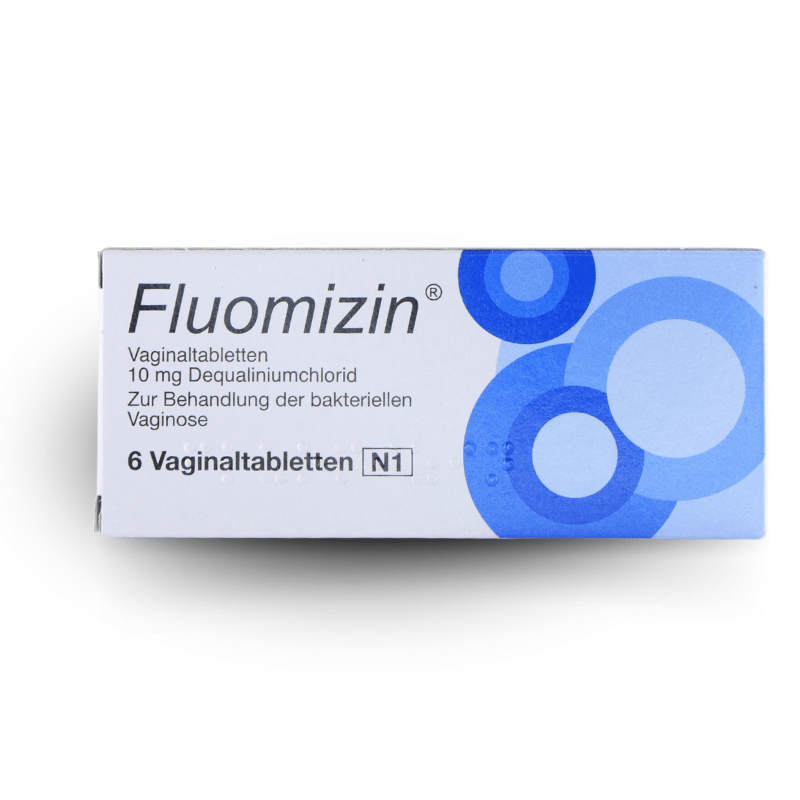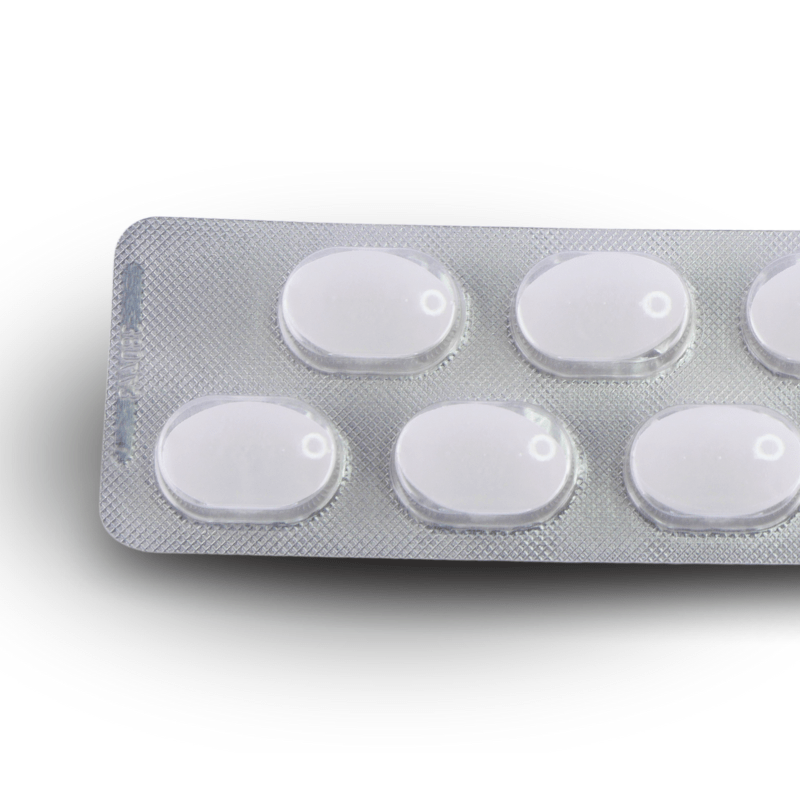Dequalinium chloride, also known by the brand-name Fluomizin, is an antimicrobial agent with broad activity against fungi and bacteria, and biofilms, when applied vaginally.
Fluomizin has low absorbency, making it a practical and low-risk vaginal treatment option for infections, whether bacterial or fungal in nature.

Dequalinium chloride works against gram-positive and gram-negative bacteria, yeasts, and protozoa – all relevant vaginal infection-related microbes (see list below). Fluomizin can be used to treat straightforward vaginal infections or those which are uncertain in terms of diagnosis.
Resistance of pathogens to dequalinium chloride is unlikely because of the way the substance works. The treatment can be highly effective against planktonic bacteria, and recent research has also shown it to is effective against biofilms.
Results of dequalinium chloride are on par with antibiotics in terms of successful treatments of bacterial vaginosis, aerobic vaginitis, vaginal yeast infections and infections of unknown cause.
What is dequalinium chloride and how does it work?
Dequalinium chloride is an ammonium salt, which probably doesn’t mean much to you, and nor does it particularly matter. Dequalinium chloride is not an antibiotic and is available over-the-counter in some countries.
This substance has been used for some time now in lozenges to combat throat bacteria associated with sore throats. Dequalinium chloride works to kill microbes by increasing cell permeability, stopping the microbe’s enzyme activity.

Once microbes lose their enzymatic powers, they quickly lose their ability to survive. It may affect the microbe’s osmotic system, cell metabolism, energy production, and protein synthesis.
In the lab, the bactericidal (germ-killing) and fungicidal (fungus-killing) powers occurred within an hour, and no resistance has been reported from any lab studies or clinical trials.
Orally and vaginally, absorption rates of dequalinium chloride are low, and therefore, toxicity isn’t considered an issue. Animal studies have found no concerns for use during pregnancy.
Using vaginal Fluomizin
Fluomizin tablets disintegrate in the vagina in the presence of moisture and break apart. If the vagina is dry, use a little water-based lubricant to help with insertion and breaking apart.

The dose in the vagina is from between four and eight times higher than what is required to inhibit the least susceptible bacteria (minimal inhibitory concentration, MIC).
The tablets are inserted deep into the vagina, usually at bedtime. The typical dose is a 10mg plain white vaginal tablet, used for six days.
Where to buy dequalinium chloride
Order Fluomizin from My Vagina.
If you live in Europe, the United Kingdom, Russia, or Asia, you are likely to have over-the-counter access to Fluomizin at a pharmacy, either in person or online. Some Europeans may need a prescription.
Dequalinium chloride is effective against many common vaginal pathogens:
- Atopobium vaginae (anaerobic gram-positive)
- Bacteroides spp. (anaerobic gram-negative)
- Bacteroides fragilis (anaerobic gram-negative)
- Bacteroides vulgatus (anaerobic gram-negative)
- Candida spp. (yeast)
- Candida albicans (yeast)
- Candida glabrata (yeast)
- Candida krusei (yeast)
- Enterobacter spp. (aerobic gram-negative)
- Enterococcus faecalis (aerobic gram-positive)
- Escherichia coli (aerobic gram-negative)
- Fusobacteria (anaerobic gram-negative)
- Gardnerella vaginalis (anaerobic gram-positive)
- Klebsiella spp. (aerobic gram-negative)
- Lactobacillus spp. (aerobic gram-positive)
- Listeria monocytogenes (anaerobic gram-positive)
- Peptostreptococcus (anaerobic gram-positive)
- Porphyromonas spp. (anaerobic gram-negative)
- Prevotella spp. (anaerobic gram-negative)
- Prevotella bivia (anaerobic gram-negative)
- Prevotella disiens (anaerobic gram-negative)
- Prevotella intermedia (anaerobic gram-negative)
- Porphyromonas asaccharolytica (anaerobic gram-negative)
- Pseudomonas spp. (aerobic gram-negative)
- Serratia spp. (aerobic gram-negative)
- Staphylococcus aureus (aerobic gram-positive)
- Streptococcus agalactiae (Group B Streptococci, aerobic gram-positive)
- Streptococcus pyogenes (Group A Streptococci, aerobic gram-positive)
Naturally dequalinium chloride-resistant bacteria
- Proteus mirabilis (facultatively anaerobic, gram-negative)
- Chlamydia trachomatis (aerobic gram-negative)
- Trichomonas vaginalis (parasitic protozoa)
Don’t know what bacteria you have? Get an at-home test.
Possible side effects of Fluomizin
Over 3,000 people so far have been in clinical trials of dequalinium chloride, with the following side effects observed:
- Well tolerated overall
- No serious adverse events recorded
- Local reaction
- Vaginal discharge
- Itching
- Burning
Dequalinium chloride safety in pregnancy and breastfeeding
Several studies have investigated the use of dequalinium chloride during pregnancy and breastfeeding with no reported adverse effects. This is likely due to the lack of absorption – it stays in the vagina.
Other products that contain dequalinium chloride
- Dequadin 10mg vaginal pessaries
- Dequavagyn 50mg controlled release ovules (8-10-day treatment)
- Dequavagyn 20mg/10g cream, controlled release (8-10-day treatment)
- Oestro-Dequavagyn 20mg/10g cream with 0.15mg oestriol (E3), controlled release (8-10-day treatment)
- Oestro-Dequavagyn 20mg/10g cream with 2mg oestriol (E3), controlled release (8-10-day treatment)
- Gyken ovules 20mg
- Erosept vaginal foam 100mg/100g
Research into vulvovaginal infections and dequalinium chloride (DQC)
Study #1
Weissenbacher, 20121, bacterial vaginosis, Fluomizin vaginal tablets vs clindamycin two per cent cream, six days
- At week 1, cure rates were 81.5 per cent for DCQ and 75 per cent in clindamycin group.
- At week 4, cure rates were 80 per cent for DCQ and 78 per cent in clindamycin group.
- Well tolerated
_________
Study #2
Radzinsky et al, 20112, non-specific vaginitis, Fluomizin vaginal tablets six days versus standard anti-infective treatment, with Gynoflor restoration afterwards
- Fluomizin group saw 78 per cent cure
- Standard anti-infective treatment saw 77 per cent cure
_________
Study #3
Dankovich and Gopchuk, 20063, abnormal vaginal flora, Fluomizin vaginal tablets, six days, pre-surgery preventative
- Out of 45 women undergoing surgery, just one had complications after surgery
- Vaginal flora became healthy in 44 women
- No adverse effects
_________
Study #4
Grishchenko et al, 20064, bacterial vaginosis in pregnant women, Fluomizin versus povidone iodide vaginally
- Resulted in favourable conditions for pregnancy and healthy baby
_________
Study #5
Grischenko et al, 20065, mixed infection, Fluomizin versus chlorhexidine bigluconate
- Fluomizin cure rate was 97 per cent
- Chlorhexidine bigluconate cure rate was 66 per cent
_________
Study #6
Demina et al, 20056, bacterial vaginosis and opportunistic flora vaginitis, Fluomizin versus povidone iodine vaginally
- Vaginal flora recovery in all pregnant women of one group after one treatment
- Vaginal clearance seen in 92 per cent of women
- No Candida albicans seen after Fluomizin
_________
Study #7
Petersen, 20027, bacterial vaginosis, yeast infections and trich, Fluomizin vaginal tablets versus povidone-iodine vaginally
- Fluomizin group saw a decrease in symptoms from 5.13 to 1.33
- BV: Fluomizin group cure rate was 96 per cent; the povidone-iodine group cure rate was 82 per cent
- Yeast infections: symptom decrease from 6.5 to 1.1
- Aerobic vaginitis: symptoms decreased from 5.0 to 1.3
- Some local irritation in some women
_________
Study #8
Schmidt, 20008, bacterial vaginosis, trich, yeast and flora imbalance in pregnant women, Fluomycin 10mg DQC vaginally for six days
- Distinct improvement in all documented clinical symptoms
Study #9
Della Casa et al, 20029, dequalinium chloride, povidone-iodine and clotrimazole tested against 18 pathogens
- Fluomizin was effective with the exception of Proteus mirabalis
_________
References
- Della Casa V, Noll H, Gonser S, Grob P, Graf F, Pohlig G. Antimicrobial activity of dequalinium chloride against leading germs of vaginal infections. Arzneimittelforschung. 2002;52(9):699-705.
- 1.Mendling W, Weissenbacher ER, Gerber S, Prasauskas V, Grob P. Use of locally delivered dequalinium chloride in the treatment of vaginal infections: a review. Arch Gynecol Obstet. Published online October 27, 2015:469-484. doi:10.1007/s00404-015-3914-8
- 2.Radzinsky V, Chetvertakova E, Ordiyants I, Misuno O. Two Stage therapy for Vaginal Infections. Akusherstvo i Ginekologiia. 2011;2011(5):78–81.
- 3.Dankovich D, Gopchuk E. New opportunities in preparation of women with reproductive tracts microbiocenosis disorder for gynaecologic intervention. Women’s Health. 2006;2006(2):1–4.
- 4.Grishchenko O, Lahno I, Dudko V, Stupak I, Storchak A. Clinical and prognostic aspects of bacterial vaginosis treatment in pregnant women. Women’s Health. 2006;2006(4):69-72. https://www.kup.at/kup/pdf/11938.pdf
- 5.Grishchenko O, Dudko V, Lahno I, Dudko L, Storchak A. Clinical and prognostic aspects of mixed etiology vaginitis treatment. Women’s Reprod Health. 2006;2006(2):8-10.
- 6.Demina T, Pilipenko O, Jotenko B, Baksheeva O. The role of anti-microbial therapy in complex treatment of women with miscarriage. Women’s Reprod Health. 2005;2005(3):99-102.
- 7.Petersen E, Weissenbacher E, Hengst P, et al. Local Treatment of Vaginal Infections of Varying Etiology with Dequalinium Chloride or Povidone Iodine. Arzneimittelforschung. Published online December 26, 2011:706-715. doi:10.1055/s-0031-1299955
- 8.Schmidt (Unknown). Unpublished. Presented at the: Open, drug utilisation trial; 2000.
- 9.Casa V, Noll H, Gonser S, Grob P, Graf F, Pohlig G. Antimicrobial Activity of Dequalinium Chloride against Leading Germs of Vaginal Infections. Arzneimittelforschung. Published online December 26, 2011:699-705. doi:10.1055/s-0031-1299954







